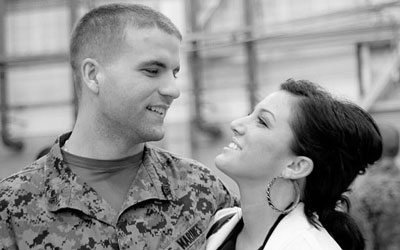In their own voice: Up to the challenge
Ryan Burns
Current Title: Software Engineer, Microsoft
Former Title: Sergeant, Marine Corps
I used to be a turboshaft engine test cell operator in the U.S. Marine Corps and now I’m a software engineer for the Universal Store Team at Microsoft. You may think those two jobs have very little in common, but the two disciplines are more closely related than you would initially think.
A helicopter engine is not that much different than a piece of software. Everything that goes into a helicopter is built and tested using a step-by-step process. These processes were designed by engineers; they failed a lot before they figured out how to make a good helicopter engine. They figured out a lot of things over the years because they failed along the way. I love failing sometimes because I learn more from failure than I do from success. And Microsoft has embraced this concept — iterative failure — as part of its culture shift toward a growth mindset. I’m really starting to see the correlation between what I’ve done my whole life and what I do here at Microsoft.
Early on in life I wanted to be a programmer. I always knew that I wanted to be in technology — I wanted to build the software that the rest of the world is clamoring for. When I began planning my transition out of the Marine Corps, I was thinking about staying in the aviation community because I really enjoy the work, but somewhere deep down there was something saying, “You should go after what you want.” The safe move was to stay in aviation. I’d already been trained, I had five years of experience; it was the right move. It took a long time to convince myself that maybe I shouldn’t make the safe move. The IT route I took was definitely a risk; I was fearful I would fail. But I decided to go all-in — that’s when I found out about Microsoft Software & Systems Academy (MSSA).
There are a lot of programs out there that are designed to help veterans. We need to help veterans get jobs. We need to help veterans get training. And I think that’s dangerous language to use. Veterans don’t want to be helped. They want to be challenged. I think that’s a fundamental mindset we need to change. Most veterans have lived a life of challenge. Whether they were a Marine or Army Special Forces, whatever it was they did, they did something excellent. Something that most people view as outstanding. Most veterans don’t want to get out of the military and go backward in their careers.
The MSSA program challenges veterans to actually do something big — possibly bigger than what they did in the military. That is one thing that most people will never find in their life again, and I didn’t know if I would ever find it. Now I wake up every morning and I know that I’m doing something that’s just as challenging and just as rewarding as being a Marine.
he best way to describe MSSA is you get out what you put in. I think that’s true anywhere in life, but especially in the MSSA program. This program is designed to find those who are going to go above and beyond what is expected. That’s what most veterans want, to do something great. You show up day one and realize this is no joke. If I want to do this, I’m going to have to put every minute of every day into it. That’s what’s really amazing about it. As an active duty Marine, I got to wake up every day and I got to focus on becoming a software engineer 100 percent. My job was to learn the technical skills to land a job and find that job. Because of that focus I knew that whatever I put into MSSA, I got out an equal amount of value.
When it came time to interview at Microsoft, I told my wife that whether or not I got the job, the experience of interviewing at one of the most sought-after companies in the world — they get thousands and thousands of applications a day — that experience alone would be well worth the entire MSSA program for me. Afterward I felt really good about my interview. I was fully prepared and I put my all into it.

We studied so hard for that interview, and we had a lot of help from MSSA and our mentors. They dedicated so much time to make sure we went into that interview prepared that I felt comfortable and relaxed. Two weeks later, I got a phone call. It was right before a holiday weekend. Nothing official, but a heads up that I had a job offer on the way. I’ll never forget it. I knew that life was about to change — in a really positive way.
